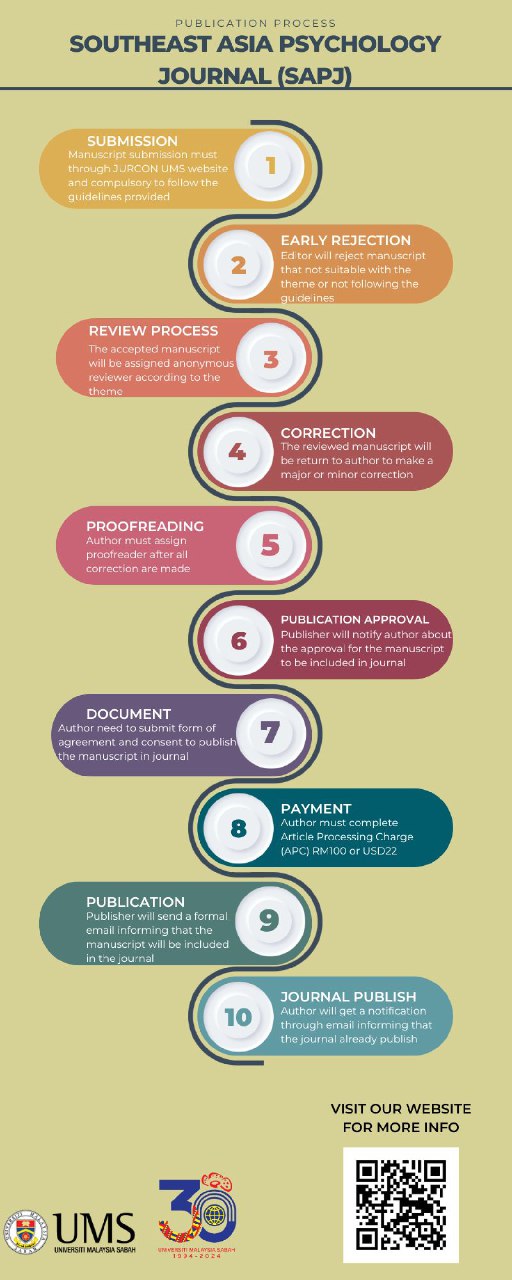PROSES KESAHAN ISI KANDUNGAN MODUL RAWATAN TERAPI RINGKAS BERFOKUSKAN PENYELESAIAN (SFBT) DALAM MENINGKATKAN KEMAHIRAN KOMUNIKASI, STRATEGI DAYA TINDAK DAN KECERDASAN SPIRITUAL UNTUK INDIVIDU YANG TELAH BERKAHWIN
DOI:
https://doi.org/10.51200/sapj.v13i1.6351Keywords:
Modul, Terapi Ringkas Berfokuskan Penyelesaian (SFBT), Proses Kesahan, PerkahwinanAbstract
Artikel ini membincangkan tentang proses kesahan isi kandungan Modul Rawatan Terapi Ringkas Berfokuskan Penyelesaian (SFBT) bagi meningkatkan kemahiran komunikasi, strategi daya tindak, dan kecerdasan spiritual bagi individu yang telah berkahwin. Pembinaan modul rawatan ini adalah berpandukan kepada Model Sidek yang telah menetapkan dua fasa utama iaitu (i) penyediaan draf modul dan (ii) pengendalian kajian rintis, proses kesahan dan kebolehpercayaan, serta proses penilaian keberkesanan penggunaan modul. Walau bagaimanapun, artikel ini hanya memberikan fokus pada proses kesahan isi kandungan modul yang dilakukan dengan mengikuti langkah-langkah berdasarkan Ahmad (2008). Untuk memastikan kesahan ke atas isi kandungan modul ini, pandangan enam orang pakar yang memiliki latar belakang yang sesuai dengan objektif dan matlamat modul telah diambil. Hasil penilaian pakar menunjukkan bahawa modul tersebut mencapai skor kesahan isi kandungan sebanyak 76%, iaitu melebihi 70% yang dikira sebagai nilaian kesahan isi kandungan yang tinggi. Ini bermaksud bahawa modul ini merupakan modul yang baik dan bersesuaian untuk mencapai objektif serta matlamat seperti yang ingin disasarkan iaitu meningkatkan kemahiran komunikasi, strategi daya tindak serta kecerdasan spiritual. Adalah diharapkan agar modul ini kelak dapat memberikan kesan positif dalam meningkatkan kualiti kehidupan individu yang telah berkahwin di Malaysia. Sekaligus, boleh dijadikan sebagai panduan kepada profesion-profesion menolong dalam mengendalikan isu-isu yang melibatkan rumah tangga yang umum diketahui amat kompleks sifatnya.
References
Ahmad, J. H. (2008). Modul & pengendalian bimbingan kelompok. Universiti Putra Malaysia.
Amato, P. R. (2010). Research on divorce: Continuing trends and new developments. Journal of Marriage and Family, 72(3), 650-666.
Amato, P. R. (2000). The consequences of divorce for adults and children. Journal of marriage and family, 62(4), 1269-1287.
Banerjee, S., & Basu, J. (2014). Personality factors, attachment styles and coping strategies in couples with good and poor marital quality. Psychological Studies, 59, 59-67.
Bargain, O., & Fougère, D. (2020). The impact of divorce on physical health: Evidence from a natural experiment. Journal of Health Economics, 71, 102-109.
Blanchard, V. L., Hawkins, A. J., Baldwin, S. A., & Fawcett, E. B. (2009). Investigating the effects of marriage and relationship education on couples' communication skills: a meta-analytic study. Journal of family psychology, 23(2), 203.
Garrison, A. (2019). The economic effects of divorce on women and children. Journal of Divorce & Remarriage, 60(3), 192-211.
Gingerich, W. J., & Peterson, L. T. (2013). Effectiveness of solution-focused brief therapy: A systematic qualitative review of controlled outcome studies. Research on Social Work Practice, 23(3), 266-283.
Gingerich, W. J., & Eisengart, S. (2000). Solution‐focused brief therapy: A review of the outcome research. Family process, 39(4), 477-498.
Jonidi, G. S., Zandi, A., & Kayvan, S. (2021). The Effectiveness of Solution Focused Couple Therapy in Improving Marital Satisfaction and Adjustment of Couples. Journal of Assessment and Research in Applied Counseling (JARAC), 3(2), 38-49.
Jusoh, A. J., Mohamad, Z., Rahman, A. M. A., Bistamam, M. N., Arip, M. A.S. M., & Jusoff, K. (2011). Construction, Reliability And Validity Of Choice Theory And Reality Therapy (CTRT) Group In Malaysian Problematic Students. International Journal of Arts & Sciences, 4(23), 391.
Kim, J., Jordan, S. S., Franklin, C., & Froerer, A. (2019). Is solution-focused brief therapy evidence-based? An update 10 years later. Families in Society, 100(2), 127-138.
Kitson, G. C., & Morgan, L. A. (1990). The Multiple Consequences of Divorce: A Decade Review. Journal of Marriage and the Family, 52(4), 913.
Meraj, M. A. (2018). The importance of marriage in Islam. International Journal of Research Granthaalayah6 (11) pp, 1-6.
Mohd Majid Konting (2004). Kaedah Penyelidikan Pendidikan. Edisi keempat. Kuala Lumpur: Dewan Bahasa dan Pustaka.
Muhammud, F. S. (2020). The Fast Track Project: The First Step Towards
Improving Divorce Cases in Shariah Court, Malaysia. e-Academia Journal, 9(1).
Murphy, J. J. (2015). Solution‐Focused Approaches. Counseling and Psychotherapy with Children and Adolescents: Theory and Practice for School and Clinical Settings, Fifth Edition, 279-316.
Nor, A. M., Karim, D. N. F. M., & Ahmad, N. (2017). From nasty to healthy divorce: A marriage and family therapy model for working effectively with divorcing Malay-Muslim couples. MOJPC: Malaysia Online Journal of Psychology & Counselling, 1(1).
Pargament, K. I., & Cummings, J. (2010). Spirituality as a Meaning-Making Framework: Theory, Research, and Practice. In K. I. Pargament (Ed.), The Psychology of Religion and Coping: Theory, Research, Practice (pp. 49-66). Guilford Press.
Rahman, A. S. A., Kusrin, Z. M., & Omar, A. F. (2014). Divorce Factor at the Syariah Court in Mukah, Sarawak from Year 2000 to 2010. Islamiyyat, 36(1).
Rahmat, N. E., Aziz, N. A., & Hassan, R. A. (2019). i-Guide Divorce: An Easy-To-Use Application Software For Non-Muslim Divorce Cases In Malaysia. International Journal for Studies on Children, Women, Elderly And Disabled, 8, 42-46
Roberts, K. J., & Wills, R. (2013). Spirituality and Marriage: Implications for Couples Counseling. The American Journal of Family Therapy, 41(5), 375-388. Doi:10.1080/01926187.2013.795436
Russell, J. D. (1974). Modular Instruction: A Guide to the Design, Selection, Utilization and Evaluation of Modular Materials.
Sheykhi, M. T. (2020). Worldwide increasing divorce rates: A sociological analysis. Konfrontasi: Jurnal Kultural, Ekonomi Dan Perubahan Sosial, 7(2), 116-123.
Shukry, A. N. A. M., & Zakaria, S. M. (2019). Konflik, Penyesuaian Hidup dan Kualiti Perkahwinan pada Awal Usia Perkahwinan. Jurnal Wacana Sarjana, 3(4), 1-16.
Sidek Mohd. Noah & Jamaludin Ahmad. (2005).Pembinaan Modul. Bagaimana membina modul latihan dan modul akademik. Serdang: Penerbit UPM.
Sidek Mohd Noah (1997). Modul penilaian dalam kaunseling. Serdang:
Institut Pendidikan dan Pembelajaran Jarak jauh (IDEAL) , Universiti
Putera Malaysia.
Smith, L. A., Johnson, D., & Williams, J. T. (2023). Culturally responsive counseling in contemporary practice: Implications for curriculum design. Journal of Counseling & Development, 101(1), 50-62.
Thomas, L. P., Fitzgerald, J., & O’Neill, P. (2023). The critical role of expert validation in suicide prevention training for counselors. Journal of Mental Health Counseling, 45(1), 1-15.
Thompson, C., Adams, R., & Fisher, P. (2021). Accreditation in counseling education: The role of expert validation in curriculum design. Counselor Education and Supervision, 60(4), 271-283.
Zakaria, H., & Ishak, N. A. (2016). Reality therapy group counseling approach on metacognitive awareness in mathematics. IOSR Journal of Humanities and Social Science (IOSR-JHSS), 21(3), 117-121.








